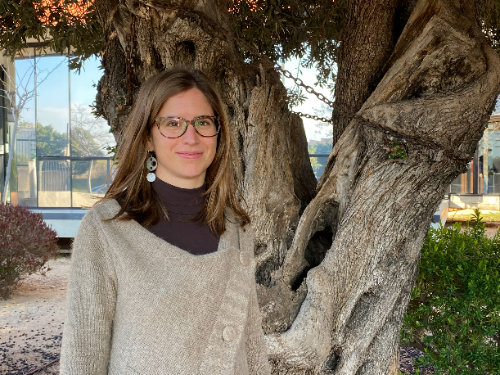
The researcher at the Institute of Molecular Science (ICMol) of the University of Valencia Marta Galbiati (Bergamo, 1986) has won one of the 15 grants for postdoctoral contracts of the prestigious Postdoctoral Junior Leader programme “La Caixa” Foundation in its Retaining modality that will allow her to develop her research project over the next three years, linked to 2D materials and spintronics, two of the fields in which the ICMol is a centre of reference.
The “La Caixa" Foundation has announced the results of its call for Junior Leader postdoctoral fellowships and awarded 45 excellent researchers. One of them has been Marta Galbiati, who obtains new support for her scientific career. The grant is worth a maximum of 305,000 euros over three years, which includes her employment contract and a complementary training plan to forge her independent line of research.
Galbiati joins the group of ICMol researchers who obtained this recognition in previous calls, such as Gonzalo Abellán, Efrén Navarro, Mónica Giménez Marqués, Jesús Ferrando, Rosa Córdoba and Natalia Muñoz. All of them have prolonged their careers in the institute and are consolidating their leadership in research groups of excellence.
The young Italian researcher graduated in Engineering Physics at the Politecnico di Milano in 2008 and then moved to France to complete her studies with a master's degree in materials science and nano-objects at the École Polytechnique.
Four years later, Galbiati received his PhD from the University Paris-Sud with a thesis entitled "Molecular Spintronics : from Organic Semiconductors to Self-Assembled Monolayers". The work was carried out at the Unité Mixte de Physique of the Centre National de la Recherche Scientifique (CNRS) and the company Thales under the supervision of doctor Frédéric Petroff and professor Pierre Seneor. Her thesis was awarded with the prestigious international Springer Thesis prize.
Joined to ICMol
After her doctorate, Galbiati moved to the ICMol to develop her postdoctoral stage in the team of Professor Eugenio Coronado, director of the centre. "I was looking for teams and reference centres in my field of research and I opted without hesitation for a centre of excellence like ICMol," says the researcher.
At ICMol, she continued her research into the study of 2D materials and 2D molecular materials for spintronics, energy storage and detection applications. To this end, she received an individual Marie Skodolowska Curie grant from the European Commission and, after a postdoctoral stay in France, she returned to ICMol as a Juan de la Cierva researcher funded by the Spanish Ministry of Science to develop her own research line.
"My goal, of course, is to build up my own research group and contribute to the development of high-density, low-power smart electronics and the advancement of energy-efficient, flexible and miniaturised spintronic devices," she says. "ICMol is a privileged site because of the technological resources at its disposal, its international relations with other centres and groups, and the high level of research it produces".
Spintronics is a technology that uses the properties of the electron spin (the natural spin of particles at the quantum level), which can be used to manufacture faster, more efficient devices with greater storage capacity.
Galbiati has been selected among the 700 candidates who applied for this scholarship programme, which includes two lines. The first one, called Incoming, is reserved for 25 employment contracts for researchers in centres with the Severo Ochoa or Maria de Maeztu seal of excellence, as is the case of ICMol. The second one, Retaining, includes 15 grants to work in any Spanish or Portuguese university. Of the 45 researchers selected, 20 are Spaniards and 25 are foreigners from 14 different countries.

